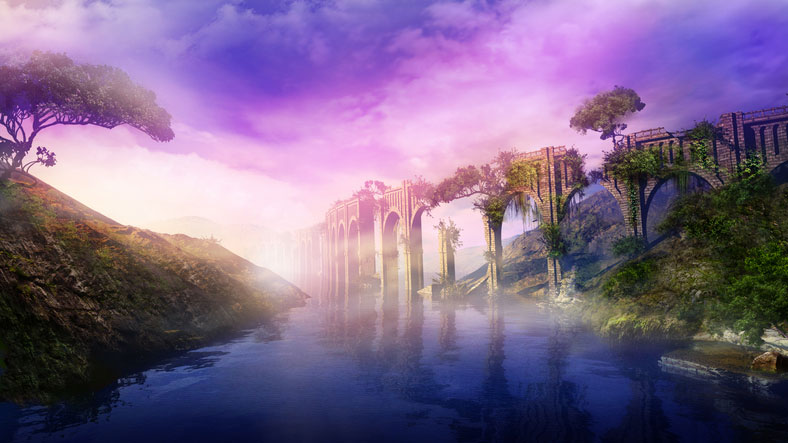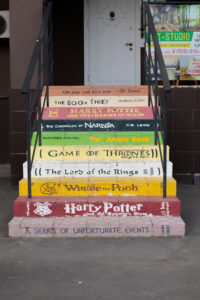Written by Scott Wilson

Many people read to take their minds away from the banality or concerns of everyday living. There is no genre that goes further than the magical, fantastical realm of fantasy.
From The Lord of the Rings to A Song of Ice and Fire, fantasy is a genre that can embrace every tone of human emotion and stretch imaginations in incredible directions.
Fantasy writers must have incredible imaginations themselves, alongside the story-telling skills to unveil them. Many fantasy worlds are extraordinary places, detailed down to the last thread—and invented entirely in the mind of the author.
Any sufficiently advanced technology is indistinguishable from magic.
~ Arthur C. Clarke
Fantasy is also a genre with high expectations. Readers want to be amazed, but they also want to understand the story, develop attachments to characters, and feel that the world you are showing them is every bit as real as their own. To achieve the willing suspension of disbelief necessary in a successful work of fantasy, authors have to go well beyond just marking out an incredible vision. They also have to make it indelible.
While many of the prototypical works of fantasy incorporate strong and clear distinctions between good and evil, modern fantasy writing has become more realistic and more nuanced. Work by Joe Abercrombie and Patrick Rothfuss in the genre has kept many of the trappings of fantasy, but introduced characters and situations with more complexity and depth.
This is an exciting era for fantasy writers, and degrees in creative writing can help them master the form and take it to new heights at the same time.
What Defines the Fantasy Writing Genre?
 Fantasy actually represents a whole family of different types of genres and sub-genres in writing today. Fantasy itself is a sub-genre of speculative fiction, a broad category full of things that have never been and may never be.
Fantasy actually represents a whole family of different types of genres and sub-genres in writing today. Fantasy itself is a sub-genre of speculative fiction, a broad category full of things that have never been and may never be.
Works of fantasy are distinguished by their incorporation of the impossible, along with an acceptance of implausibility. A fantasy character may fly through the air on a broomstick with no explanation given other than magic; a character in science fiction may do the same, only the broomstick would be called a speeder bike and its levitating abilities ascribed to repulsorlift technology designed to push against gravitational forces.
Magic is a common characteristic of fantasy, but not a required one. Other fantasy works exist in mythical versions of historical reality, embracing swords more than sorcery without the limitations of actual human history.
Fantasy, if it's really convincing, can't become dated, for the simple reason that it represents a flight into a dimension that lies beyond the reach of time.
~ Walt Disney
Fantasy is ancient, a primal example of the stories that humans have woven for one another for as long as tales have been told. Myths and legends are the progenitors of modern fantasy works. Writers in the genre both re-tell the classic stories of gods and monsters and build on them with new visions of the fantastic.
The wide range of sub-genres in the field of fantasy makes it easy to find a niche that will connect your skills with the demands of readers.
That depth of history allows for extensive use of symbolism and allusion in fantasy today. And the enduring appeal of fantasy tales points to some deep connection to such stories in the human psyche.
It’s likely that fantasy taps into some deep narrative need in people. That makes it a genre that’s going to be a home for creative writers for generations to come.
How To Become a Fantasy Fiction Writer
 Anyone with a high-powered imagination can make a dent in fantasy fiction writing.
Anyone with a high-powered imagination can make a dent in fantasy fiction writing.
There’s no better example of this than the man who re-defined and re-invigorated the genre, J.R.R. Tolkien. While The Hobbit and The Lord of the Rings were the works that were published to wide acclaim and enduring popularity, they in many ways represented only small windows into the larger world that Tolkien spent much of his life inventing. Middle Earth grew out of languages that he started inventing as a child. The Elvish tongue of Quenya was an exercise of pure imagination. Only as he felt the need to develop a history to explain the development of the language did the tales and myths of the One Ring come about.
Imagination is just the start. It took Tolkien most of the rest of his life to take even a fragment of his vision and put it to paper… and he was a professor of old English!
Developing the writing skills to take your fantastic visions and make them both relatable and compelling takes hard work… maybe harder than anything faced by writers of more conventional genres.
Like those other creative writers, to become a fantasy author you’ll need to crack the rudiments of grammar and vocabulary. You’ll need to understand characterization and tone. And you’ll have to master the conventions of the genre.
But those are just the basics that any responsible writer has to learn along the way. There are definitely some types of creative writing skills that are more necessary for fantasy authors than those in other genres.
The Intricate Vision of a World Builder
 Fantasy worlds may borrow from the real thing, but they are their own setting. World-building is a skill that has to rank highly for fantasy authors. Putting together an internally consistent universe that allows readers to suspend their disbelief is a skill that can be taught.
Fantasy worlds may borrow from the real thing, but they are their own setting. World-building is a skill that has to rank highly for fantasy authors. Putting together an internally consistent universe that allows readers to suspend their disbelief is a skill that can be taught.
In some cases, the universes created for fantasy works take on their own lives quite apart from the literature that inhabits them. Geographers study maps of Middle Earth; bestiaries have been compiled for the exotic fauna of Robert E. Howard’s Hyborian Age setting. To come up with such a detailed and coherent setting requires not just imagination, but discipline as well.
A Command of Language and Voice
A part of fantasy milieus is set through the use of language. Susannah Clarke’s Jonathan Strange & Mr. Norrell perfectly captures the 19th-century voice of English novelists like Jane Austen and Charles Dickens, lending verisimilitude to her setting and a reality to her English magic that would otherwise fall flat. In other fantasy works, like George R.R. Martin’s A Song of Ice and Fire, entirely new languages are invented and used to establish exotic fantasy worlds.
All of this requires both a love of language and a strong command of the grammar and rhythm. Whether portraying a formal medieval banquet or a conclave of elves in the depths of the forest, the voice of the work and of the characters in it helps set the tone for fantasy readers.
Familiarity With the Fantasy Canon
 Because fantasy is such a prolific genre with such a long history, writers have to work hard to gain familiarity with the canon of the field. Their readers will be deeply familiar with the seminal works in the field. Your own writings will be viewed through the lens of that experience. To design and build the story that you want to tell, you will need to allow for the conventions—either adopting or subverting them as needed to craft the experience you want to convey.
Because fantasy is such a prolific genre with such a long history, writers have to work hard to gain familiarity with the canon of the field. Their readers will be deeply familiar with the seminal works in the field. Your own writings will be viewed through the lens of that experience. To design and build the story that you want to tell, you will need to allow for the conventions—either adopting or subverting them as needed to craft the experience you want to convey.
It’s also valuable to read widely in the field of history and historical fiction. Many apparently fantastic elements in some fantasy works are in fact all too real… ripped from the pages of obscure history books, repurposed into new worlds.
Plotting Fantastic Stories Like a Pro
Fantasy is a necessary ingredient in living, it's a way of looking at life through the wrong end of a telescope.
~ Theodore Geisel (Dr. Suess)
Fantasy works don’t have to be long, but they often are. In fact, it’s tough to find fantasy novels today that aren’t multi-part series, with sequels and prequels with long story arcs planned from the very start.
That kind of long-term thinking requires highly developed plotting skills. Bringing together the threads of large casts of characters and kingdoms across generations, as many fantasy authors do, requires excellent planning and documentary skills.
Basic Writing and Editing Skills
Long written works take a lot of basic, old-fashioned, key-clacking writing. Novels of five-hundred to a thousand pages, like A Dance with Dragons, don’t write themselves. The basic skill of putting 300,000 words together coherently takes practice.
The discipline of sitting down and cranking out a couple of thousand words a day is just the start, however. Fantasy authors are as prone as any other to going down blind alleys, laying down incomprehensible sentences, and making basic mistakes of grammar and form. So those high word counts also mean a lot of long hours in self-editing.
It’s possible to develop all the key traits for becoming a fantasy writer on your own, but an education dedicated to creative writing is a more certain route to the lands of fairy and dragon.
How You Can Build Your Skills as a Fantasy Author Through Online Creative Writing Degrees
Formal training in creative writing through a degree program offers a well-lit path to the skills needed as a fantasy writer. Although most creative writing degrees don’t offer specific concentrations in fantasy or other such genres, they do support fantasy writing.
Fantasy is hardly an escape from reality. It's a way of understanding it.
~ Lloyd Alexander
More importantly, however, they encourage the exploration and understanding of a broad range of writing formats, genres, and techniques. Although not focused on fantasy, that kind of broad exposure to literary styles, techniques, and ideas will benefit your writing in any genre. The cross-pollination of gritty, realistic historical fiction with fantasy is part of the magic behind Game of Thrones; the wit and narrative style of Jane Austen helped make Jonathan Strange & Mr. Norrell the groundbreaking sensation it was.
The Inklings
 To gauge the value of an education in English and creative writing to becoming a fantasy writer, you don’t have to look any further than the University of Oxford during the 1930s and 1940s. On Tuesday mornings, in the back room of The Eagle and Child, a local pub, a group of writers and scholars known as The Inklings spurred some of the most notable fantasy writers of the age to their greatest accomplishments.
To gauge the value of an education in English and creative writing to becoming a fantasy writer, you don’t have to look any further than the University of Oxford during the 1930s and 1940s. On Tuesday mornings, in the back room of The Eagle and Child, a local pub, a group of writers and scholars known as The Inklings spurred some of the most notable fantasy writers of the age to their greatest accomplishments.
Charter members and their most notable works of fantasy include:
- C.S. Lewis, The Chronicles of Narnia
- Owen Barfield, The Silver Trumpet
- R.R. Tolkien, The Lord of the Rings and The Hobbit
- Charles Williams, All Hallows Eve
- R. Eddison, The Worm Ouroboros
- Christopher Tolkien, editor of the Middle-earth legendarium
Although the group was informal, it incorporated some of the same kinds of experiences that you will encounter in any good creative writing program today. A group of knowledgeable, insightful, interested readers and writers gathering together to discuss their work and encourage one another in their pursuits.
Many of the members, including Lewis and the Tolkiens, credit others of the Inklings for heavily influencing their own writing and providing the support and encouragement needed to finish and publish their works.
How do creative writing programs develop your own knowledge and skills to give you a shot at similar fantasy success?
Wide-ranging Reading Requirements Expose You to Every Narrative and Literary Technique
 Writers learn to write by reading. A creative writing program will inundate you with reading assignments reaching into every corner of the English literary world. You’ll be exposed to great authors and obscure. With the guidance of professors, you’ll learn how to dissect different kinds of writing to analyze how they work—or don’t work—to deliver the sort of story the writer is trying to tell. It’s an invaluable education for analyzing your own writing styles and developing effective techniques in fantasy writing.
Writers learn to write by reading. A creative writing program will inundate you with reading assignments reaching into every corner of the English literary world. You’ll be exposed to great authors and obscure. With the guidance of professors, you’ll learn how to dissect different kinds of writing to analyze how they work—or don’t work—to deliver the sort of story the writer is trying to tell. It’s an invaluable education for analyzing your own writing styles and developing effective techniques in fantasy writing.
High-volume Writing Assignments Develop Your Technical and Practical Skills
Every writer of every stripe will tell you that the only way to really learn how to write is by writing. In a good creative writing program, you won’t have any other option. Whether it’s work on your required final project or any of the myriad of smaller, directed writing assignments, or even writing up feedback on the work of others, you’ll find your fingers constantly flying to keep up. That helps build the kind of discipline you’ll need in writing long works of fantasy as well as a high level of practical experience in putting sentences, paragraphs, and full pages of words together.
Discussion and Feedback Help You Find the Lines Where Disbelief Is Suspended
Fantasy writers in particular have a tough path to walk in determining what the typical reader will accept as a part of the tale and what may be rejected as a fantasy too far. The regular review, feedback, and discussion of a creative writing program from both professors and fellow students will help you develop the feel for that line. By putting your imaginary tales in front of a wide range of readers to face scrutiny, you’ll get a good sense of how the typical reader will respond to your stories.
The Time and Space To Explore Your Imagination
 Many creative writing program graduates speak of the gift of time that their studies have given them. Attending college doesn’t magically create time out of thin air, as a character in one of your stories might. It does, however, force you to carve out minutes and hours from your life to dedicate to honing your craft. The time to contemplate, invent, and revise your stories and worlds becomes an invaluable part of making them better.
Many creative writing program graduates speak of the gift of time that their studies have given them. Attending college doesn’t magically create time out of thin air, as a character in one of your stories might. It does, however, force you to carve out minutes and hours from your life to dedicate to honing your craft. The time to contemplate, invent, and revise your stories and worlds becomes an invaluable part of making them better.
Networking and Professional Development To Get a Foothold in Publishing
Creative writing degrees are good about exposing students to the practical side of becoming published writers. Both by featuring guest lecturers and instructors who are published authors that have gone through the grinder, and by cultivating long-term relationships with industry professionals and organizations, creative writing programs give you the inside view of how fantasy sausage is made.
By the same token, you’ll also meet the right people and develop the right relationships to get your fantasy manuscripts in front of decision-makers who can turn them into real books.
Online Creative Writing Programs Are a Perfect Fit for Reclusive Fantasy Writers
Although many college degrees are available online today, creative writing programs are particularly well-suited to the format. While getting together with professors and fellow students, participating in workshops, and engaging in seminars are all valuable parts of a creative writing program, the reality is that you spend a lot of time on your own no matter what. While you are ploughing through a stack of reading assignments or polishing up your own writing work, whether or not you are physically on campus doesn’t matter a lot.
Many online creative writing programs do still involve at least a handful of meetings, sometimes on campus or sometimes in more pastoral surroundings at writer’s retreats or conferences.
Low-residency or entirely online creative writing programs let you focus on your work in the comfort of your own home, and connect with your classmates through the magic of the internet any time you like. Turning in your magnum opus at 3am by e-mail won’t cause anyone to blink an eye. Online video seminars allow you to kick your ideas around and comment on works just as if you were one of the Inklings sitting in the back of The Eagle and Child… but without the commute to Oxford.
Considering the Right Creative Writing Degree Level to Become a Fantasy Fiction Writer
 Creative writing is taught at every level in the American university system. That offers future fantasy writers a lot of options in how far they want to take their studies… a few weeks in a certificate program to put some polish on existing expertise, or a decade pursuing an advanced degree studying literature at the deepest levels are both on the table.
Creative writing is taught at every level in the American university system. That offers future fantasy writers a lot of options in how far they want to take their studies… a few weeks in a certificate program to put some polish on existing expertise, or a decade pursuing an advanced degree studying literature at the deepest levels are both on the table.
There’s no single right answer to finding the best degree for a fantasy writing career. Much depends on your own goals, your finances, and your availability. But that also means that there are good educational options no matter what your position or path.
Certificate Programs in Creative Writing
Certificates offer a concentrated dose of college coursework in writing without a big time commitment and for a relatively affordable price. These courses often focus on particular genres or techniques, which can make them a good option for writers who need to focus on a particular area of improvement to up their fantasy writing game.
Associate Degrees in Creative Writing
Two-year degrees deliver the basics in grammar, writing, and editing together with a general liberal arts education that gives you a background for future studies. Sometimes called transfer degrees, these will often be accepted at four-year colleges as partial progress toward earning a full bachelor’s degree.
Bachelor’s Degrees in Creative Writing
The four-year bachelor’s degree is considered the standard entry-level degree in most American professions. It comes with the right combination of general knowledge and critical-thinking skills and specific professional training to make you a competent writer in all kinds of different writing jobs. With more opportunity to specialize in certain creative writing areas, this also gives you more chance to focus developing your expertise in fantasy.
Master’s Degrees in Creative Writing
The Master of Fine Arts, or MFA, in creative writing offers an elite education in everything that goes into great works of literary art. But any sort of master’s in creative writing offers two or three years of intensive, focused study on the arts of weaving a story and polishing it to the highest level.
Doctoral Degrees in Creative Writing
Doctoral programs in creative writing are less aimed at writing than at teaching writing. Although a master’s degree has long been the standard for creative writing teachers, new PhD programs are delivering a more intensive academic focus for future professors that can take five or more years to complete.
Of course, the longer the program, the more expensive the education. Admissions committees also get more and more selective the further you go. But the level of training and the personalized attention you get will also become more intense the more advanced your level of study.
No matter which route you choose, you’ll come out the other side with better writing skills than you started with. You’ll also have a better idea what it takes to succeed as a fantasy author, and you’ll have the network of support and assistance you need to dance with your own dragons in the publishing wars to come.



